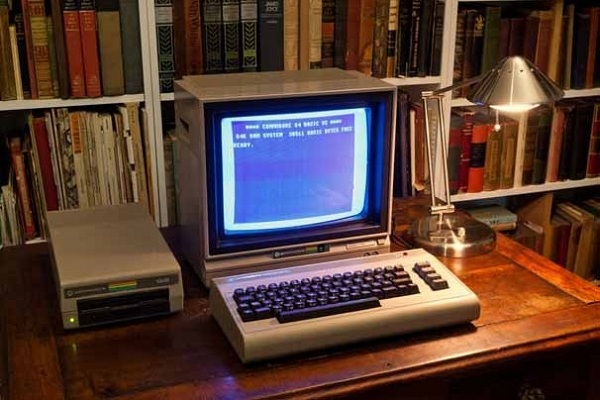I was startled to read that the Commodore 64 home computer was released 30 years ago, in 1982. I remember the event very well. I'd been working in computers for a while already, and in 1982 was a mainframe programmer. We all laughed at the Commodore 64 at the time, regarding it as a toy, but it produced some very respectable results for its day.
Benj Edwards wrote an article for PCWorld, describing how he tried to use a 30-year-old Commodore 64 (complete with a double-sided floppy disk drive holding 170 kilobytes - not gigabytes, not megabytes, but kilobytes - per side, a cassette drive, and a whole 64 kilobytes of memory!) for his modern computing needs. He even managed to send a Tweet from it! It makes fascinating reading, and brought back all sorts of memories for me.
Commodore 64 system (image courtesy of PCWorld)
It's amazing how much we take for granted with our modern computer systems. Any modern smartphone has much more computing power than a Commodore 64 - for that matter, some of the more advanced digital wristwatches can make the same claim! As for our larger computers of the day . . . I can remember when a South African oil company where I worked upgraded its IBM System/370 Model 145 mainframe from one to two megabytes of main memory. Several computer specialists were horrified at our extravagance. "Why on earth does a mere oil company need an entire two megabytes of memory? It's not as if you're a university needing it for scientific research, you know!"

Peter

One of the local HAM radio packet repeater is run with a C=64. It has a tape drive, a 1541 5.25 drive and a 1571 3.5 drive. Early style text messaging at it's best :)
ReplyDeleteI use a little CGMMSTICK (1" by 3.5") that has the power of a C64 to run electronic devices. Connects to keyboard/monitor and uses an SD card as "floppy drive". Back to BASIC! :-P
ReplyDeleteI remember upgrading my Radio Shack TRS-80 (Trash Eighty) to a massive 4k of memory (yes, K) and that included space for the operating system (BASIC). The cpu was in the keyboard, not a separate box, so that's where I was doing the soldering. No hard drive and no diskette -- data was stored on an audio tape cassette.
ReplyDeleteI was involved with Micros right after the Mits Altair 8800 came out. Later we bought an Imsai 8080 and put 16k of static ram in it (quite a bit if the chips are just 256 bytes x 1 bit wide). The thing consumed so much power we couldn't put the top on it as the cooling fan didn't have enough oomph to remove the heat fast enough.
ReplyDeleteI played with the C64 and liked it a lot. It had a fair amount of computing power for the time without a big price tag.
Now a days, the $250 PC I have outstrips anything IBM was making 30 years ago. The C64, however, is still a nice toy.
Some one has recreated the thing, but it's been too long since I saw it to remember the price tag.
I'd been a suboperator on some of Big Blue's Big Iron through the 1980s, and in 1990 I got to run a System/36 with an 8-inch floppy drive. Now it seems quaint, but back then I considered it miraculous that you could stuff so much power into a system unit the size of a washer/dryer pair.
ReplyDeleteWe are so lucky!
ReplyDelete